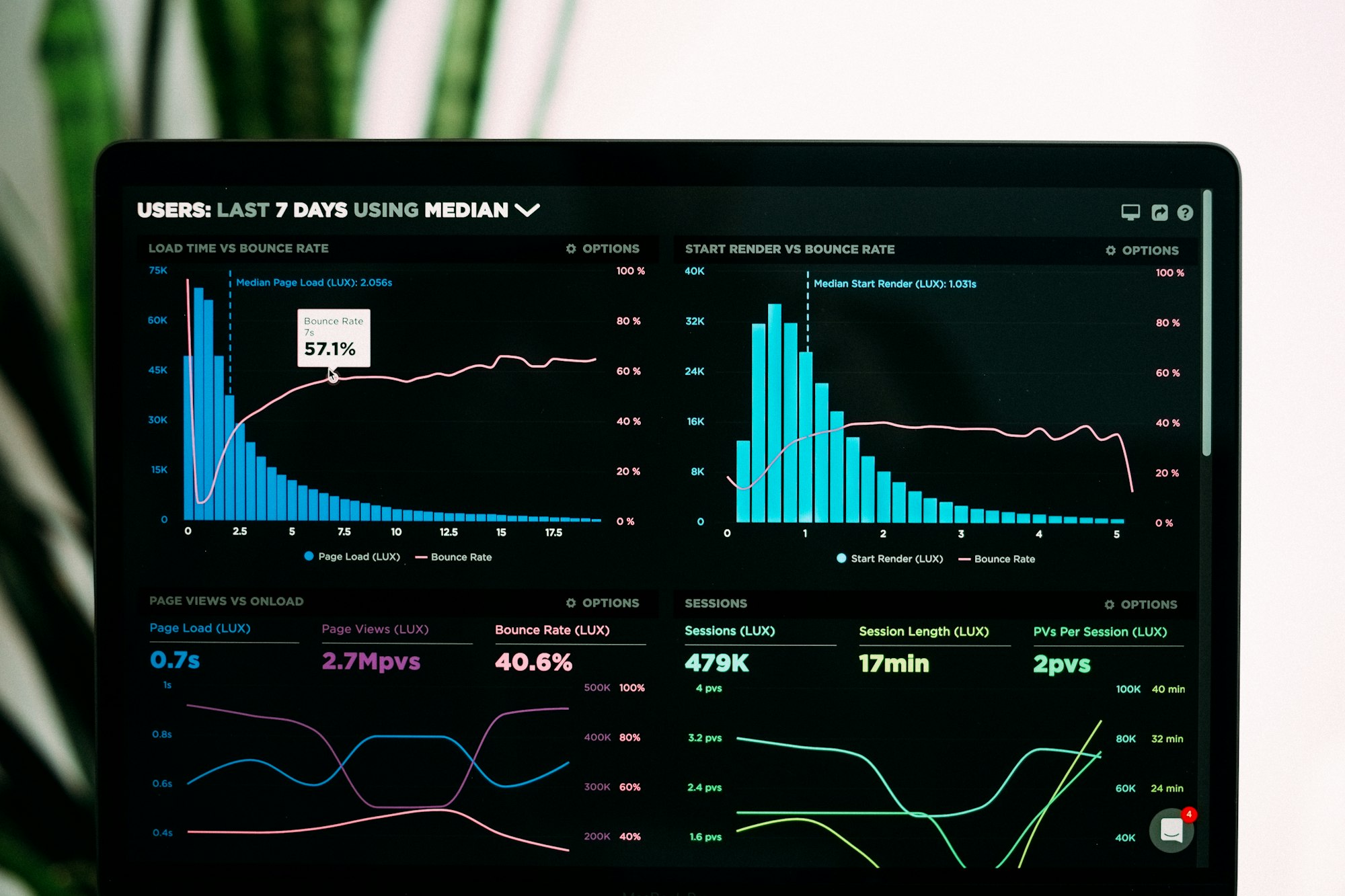Content analytics is a powerful tool to help you understand the performance of your content and make better data-driven decisions. It can provide valuable information about the reach and engagement of your content, as well as track metrics such as clicks, views, conversions, and more.
We’ve rounded up 10 of the best analytics tools that can help build out a successful content strategy.
From basic tracking to comprehensive insights, these solutions are sure to give you the data-driven edge you need.
1. Google Analytics (GA4):
Google Analytics 4 is one of the most widely used web analytics tools on the market today (previously - Universal Analytics), and for good reason and provided by Google.

At its core, GA4 works similarly to the old version of Google Analytics—it collects data from visitors on your website, including demographics such as age and location. However, it has a few extra bells and whistles.
For instance, you can create custom reports to analyze website usage patterns over time or target specific groups of users. You can also set up automated alerts for when certain trends appear in your traffic.
In addition to collecting data about visitors on your website, GA4 also enables you to track activity across multiple devices. This lets you determine which device(s) are driving the most traffic to your site, allowing you to tailor content accordingly.
It also helps you gain insight into how people interact with different parts of your website and how they make purchases.
But it’s not enough to just have access to these analytics; you need to be able to make sense of them in order to drive meaningful results. That’s where the best analytics tools come in.
It tracks and reports website traffic. It's the latest version of Google Analytics, and it offers a number of new features, such as a user-friendly interface, improved data insights, custom reporting capabilities, advanced segmentation capabilities, and support for AI-powered features.
GA4 also allows users to integrate Google Ads campaigns and utilize cross-device tracking.
It's free, user-friendly, and provides a wealth of data about your website visitors so you can adjust your strategies accordingly. Plus, it integrates with Google Ads for an even deeper analysis of your marketing.
2. Kissmetrics:
Kissmetrics is an advanced marketing analysis platform that goes beyond traditional web analytics solutions.
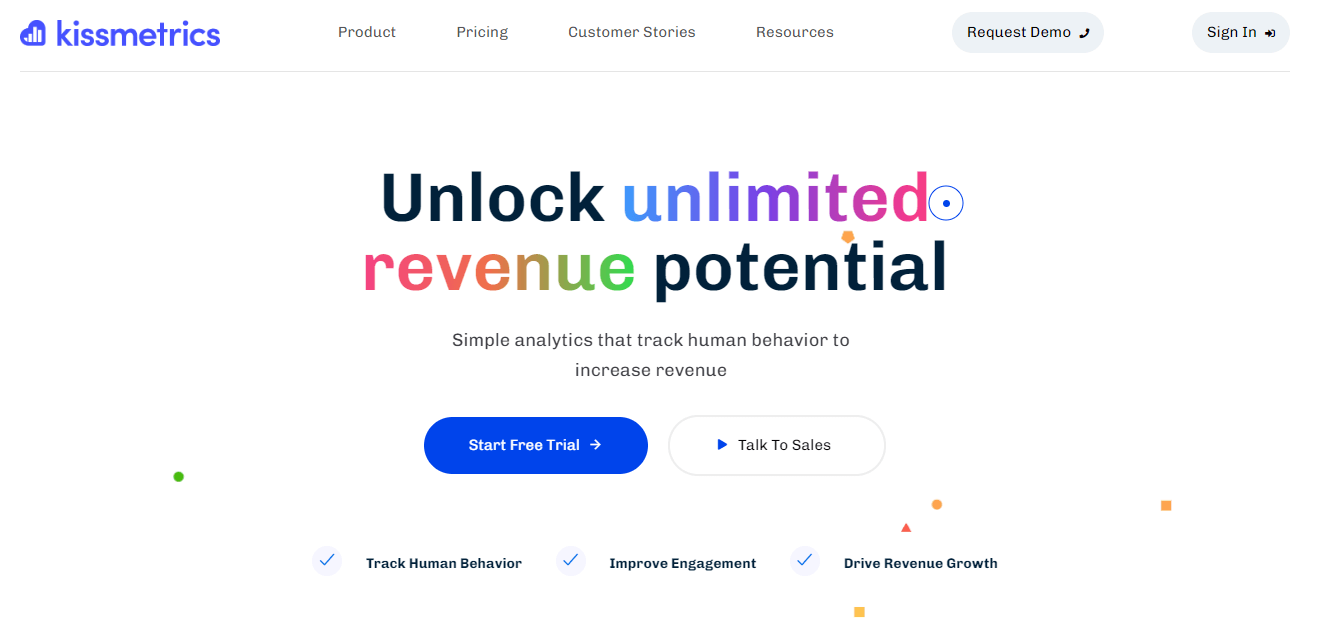
Kissmetrics offers several features such as A/B testing, multivariate testing, cohort analysis, event tracking & reporting, email campaigns & automation, and more.
This comprehensive suite of tools allows businesses to gain insights into their customer's engagement journey and develop strategies that will drive conversions and increase revenue.
Kissmetrics uses advanced algorithms to provide accurate data that helps business owners make more informed decisions about their products or service. Businesses also have access to dynamic dashboards where they can monitor user activity in real time and draw insights for better decision-making.
3. Hotjar:
Hotjar is an all-in-one solution for monitoring website activity and user feedback (including heatmaps).
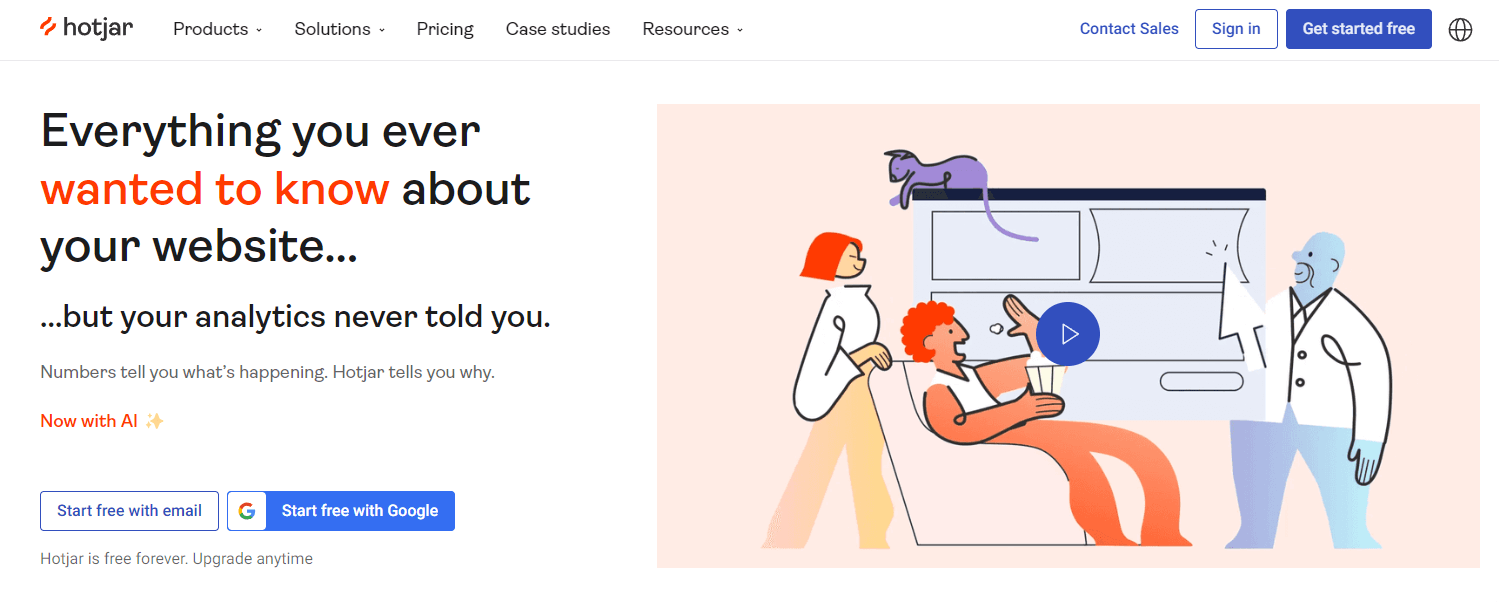
Through its visual dashboard interface, you can quickly analyze visitor behavior such as page views and clicks —allowing you to identify what's working and what needs improvement.
Hotjar also offers website designers tools such as Funnels and Heatmaps that can be used to understand the user journey across multiple pages or user actions throughout a single page respectively.
With its Conversion Funnels feature, one can analyze which steps of their funnel are most performing or underperforming so they can tweak them accordingly.
The Feedback Polls tool allows you to collect responses from visitors in real time by embedding surveys directly into your website.
In addition, Hotjar gives users access to its survey platform which enables the collection of qualitative data from customers through surveys. This helps businesses gain an understanding of what users think about their experience on the website and how it could be improved.
4. Mixpanel:
Mixpanel is another advanced web analytics platform that focuses on tracking user action on websites or mobile apps over time.

By connecting data from multiple sources, Mixpanel provides powerful insights into user behavior.
Teams can analyze how users interact with their product over time or across different platforms. It enables them to identify areas for improvement and develop strategies to increase conversions.
With its easy-to-use dashboard, Mixpanel helps teams respond quickly and accurately to customer feedback.
With its range of customization options including event tracking rules, notifications, and alerts, Mixpanel makes it easy for teams to build a tailored user experience that meets their needs.
Through its integrations with other software tools such as Slack and Google Analytics, they can gain insight into how customers are engaging with their app or website over time.
5. Splunk:
If you're looking for an enterprise-level solution for analyzing log files from databases or IT systems (e.g., network traffic), look no further than Splunk® Enterprise Security Suite (SES).
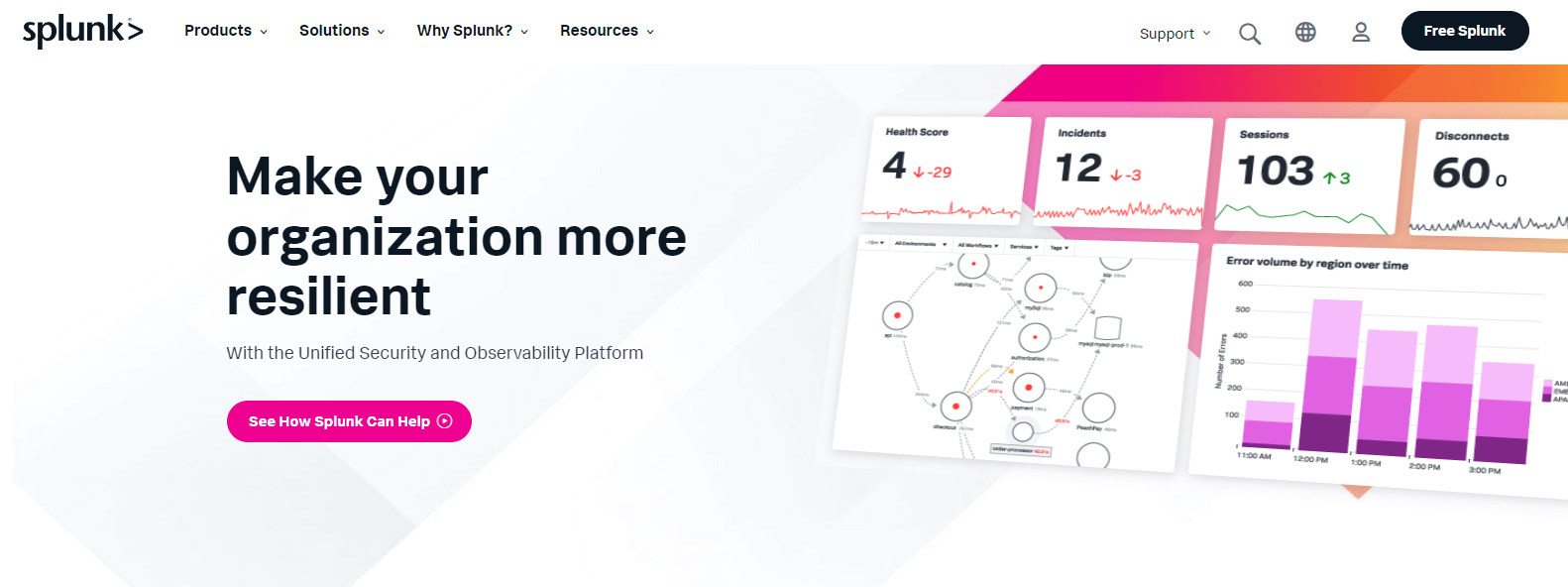
This service offers real-time searching and alerts for threat detection as well as insight into system performance issues.
Use Splunk to collect, store, search, monitor, and report on log data from distributed systems.
Logs are broken down into easily searchable events with associated metadata which can then be explored visually using dashboards or used to generate alerts when unusual activity is detected.
This approach makes it easy for analysts to understand the data being collected without needing any prior knowledge.
In addition to monitoring logs, Splunk also provides monitoring tools like application performance management (APM) which allow for a deeper look into how applications are performing across multiple servers.
With these tools, customers can track response times for different components of their applications and identify areas in need of optimization.
Splunk's collection of software also includes analytical tools like predictive analytics which can help organizations uncover trends in their data before they happen.
As well as being able to predict future outcomes based on current trends the software also allows users to explore alternative scenarios in order to evaluate what-if scenarios or test various strategies.
6. Cyfe:
Cyfe is great for businesses who want access to their marketing data without having to sift through multiple dashboards or reports each day, it brings all your relevant info together onto one platform in customizable widgets that update in real-time.
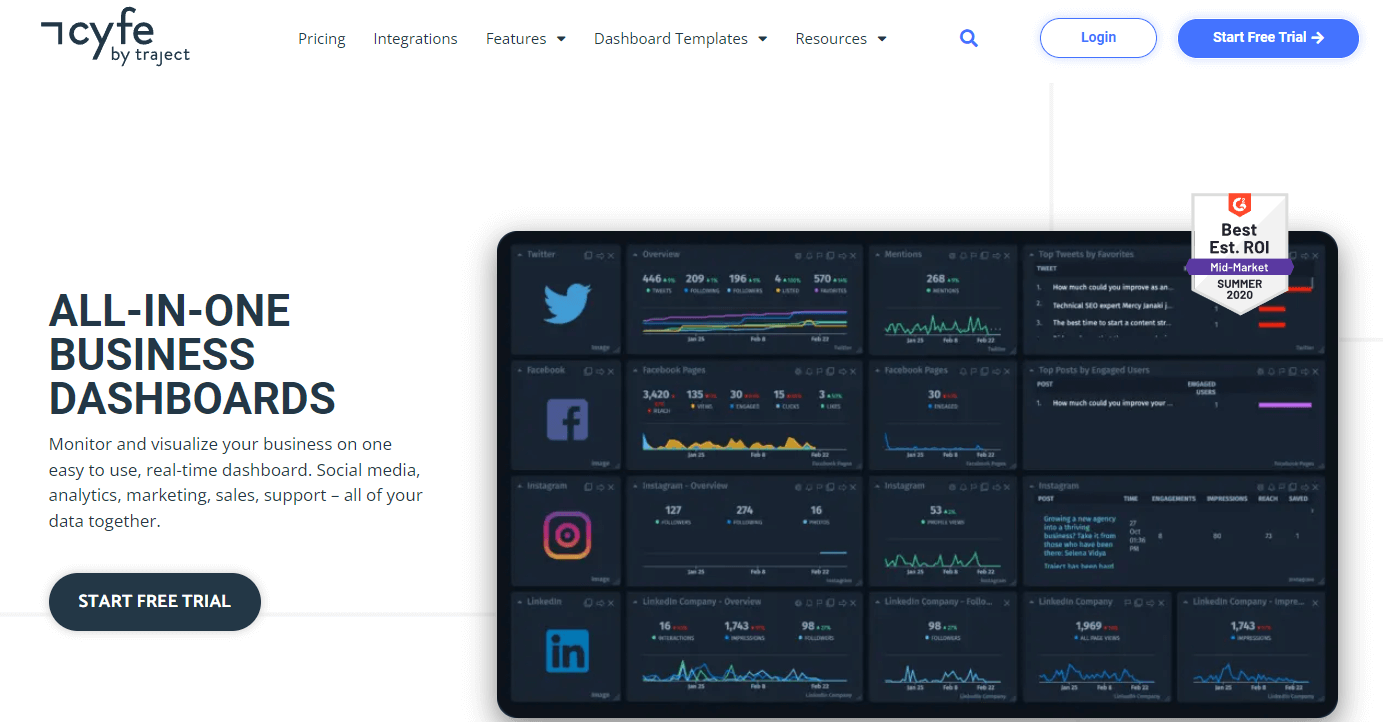
The company is uniquely known for creating a business dashboard app, designed to analyze, transform and report data from different integrated sources of business intelligence.
Cyfe allows users to customize widgets for added flexibility and control over the way they monitor and display their data. Users can create custom dashboards tailored to meet their needs by adding popular services or integrating specific data points from other sources.
The dashboard can be accessed remotely on any mobile device or computer. With its open API integration capability and unlimited team collaboration tools users have greater control over how their data is analyzed.
Cyfe also has advanced security measures in place to ensure user data remains secure. It provides encryption for user authentication as well as built-in backups of all user data stored securely in the cloud.
Automated alerts keep users informed about potential risks while detailed audit trails provide insight into who has access or made changes to the system.
7. Adobe Analytics:
Adobe Analytics gives users access to powerful features like segmentation, funnel reports, cross-device reporting, advanced attribution modeling, clickstream analysis, and more.
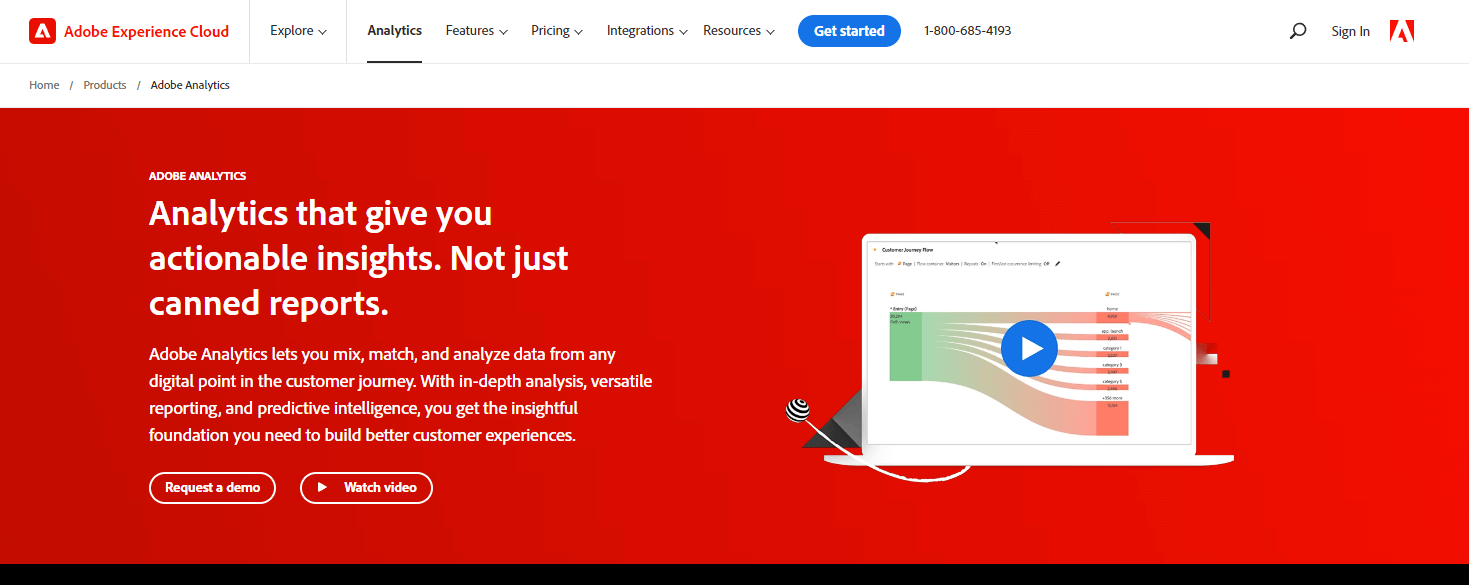
It's designed with enterprise customers in mind, offering enhanced scalability, reliability, and security.
Adobe Analytics offers an intuitive interface that allows users to customize their dashboards for easy data visualization. It also offers robust segmentation capabilities that let users tailor reports according to their precise needs.
This enables them to gain deep insights into the behavior of individual consumers or target audiences in order to make informed decisions. Other features include A/B testing, multi-channel analysis, predictive analytics, forecasting, and marketing mix modeling.
In addition to these features, Adobe Analytics integrates seamlessly with other Adobe products and third-party solutions for even deeper insights into customer behavior.
Organizations can use this data in multiple ways to better understand what works and what does not when it comes to delivering marketing campaigns or digital experiences.
8. Parse.ly:
Parse.ly provides an end-to-end content intelligence platform that allows marketers and publishers alike to get granular analysis on topics covered by their various channels; such as blog posts, white papers, email newsletters, as well as insights into audience preferences, etc.
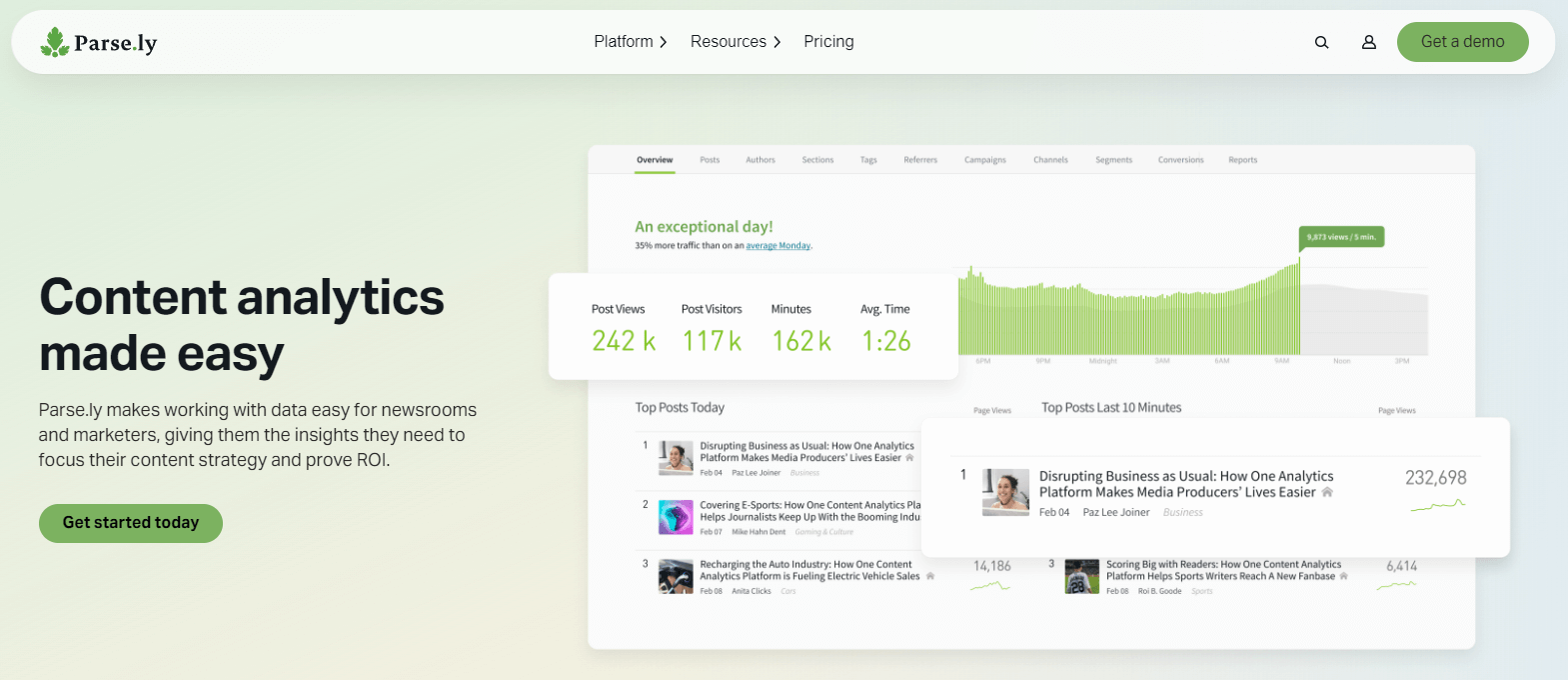
Most analytics tools are complex and require extensive training. Parse.ly’s intuitive dashboard gives everyone access to deep insights about your content. Make everyone on your team “the data person.”
Parse.ly offers several features that allow you to understand and optimize the performance of your online content.
It provides detailed analytics about pageviews, shares, referrers, scroll depth, visitor engagement, site search activity, segmentation analysis, active users by time period, and more. You can also use it to track performance metrics for individual posts or authors.
Parse.ly integrates with various CMS platforms such as WordPress, Drupal, and Squarespace, as well as popular social media channels like Twitter and Facebook. Its intuitive dashboard allows you to quickly view all your data in one place so you can easily analyze it in comparison to other websites or within your own site.
The platform also provides A/B testing tools which give you the ability to test different versions of headlines or copy in order to gauge reaction from readers. This helps you identify which version is most effective at driving engagement.
In addition to providing detailed analytics, Parse.ly also offers a range of services designed to help publishers increase their audience and monetize their web properties.
For example, its Content Intelligence service uses artificial intelligence technology to optimize page layouts and create personalized recommendations for readers.
9. Clicky:
Clicky is a bit different than other web analytic services because it provides a simpler / more intuitive interface that doesn't require any coding knowledge from users.
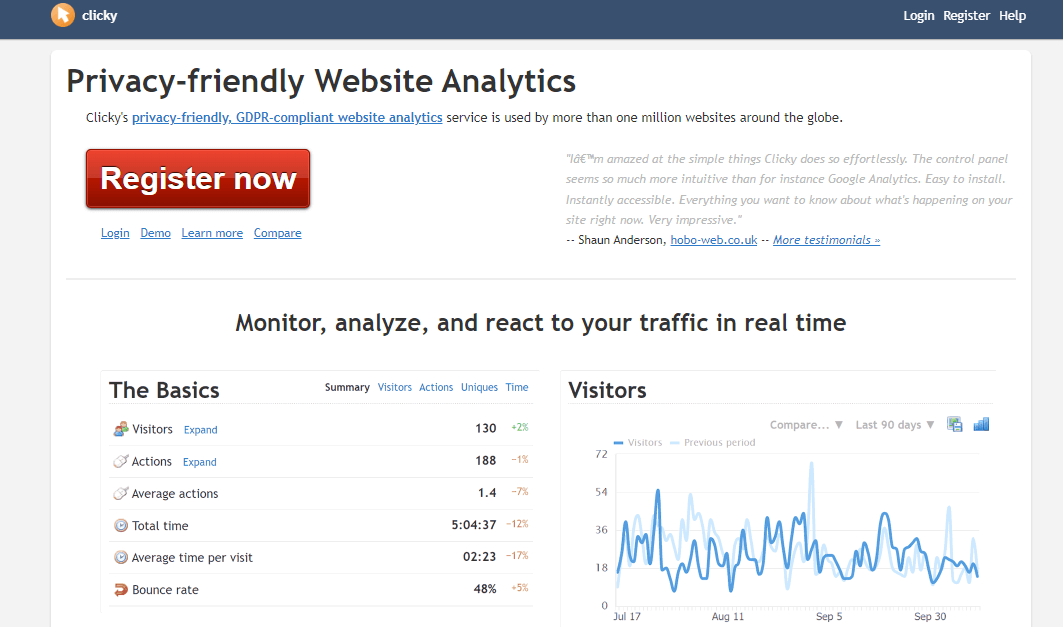
It offers a comprehensive suite of features including real-time visitor tracking, content analysis, search engine optimization (SEO), referrer tracking, heatmaps, goal conversion tracking, and more.
With its easy-to-use dashboard and mobile app options, Clicky makes it simple for users to track user activity on their websites and apps.
However, it still includes many useful features like heatmaps/visibility maps, keyword ranking & geo-targeting options, etc. Plus it offers competitive pricing plans compared with other services in its class.
Unlike other analytics software such as Google Analytics or Mixpanel which requires coding knowledge to set up and use effectively, Clicky offers an intuitive interface that is easy to set up and use for nontechnical individuals.
It also provides users with useful analysis tools such as trend graphs and line charts that make the data easier to understand so users can take action quickly on insights gained from their website data.
By using Clicky's features, businesses can gain valuable insights into how users are engaging with their websites and make decisions about how to improve the experience for visitors.
From understanding website traffic trends over time to finding out which pages are producing the most conversions or driving the most conversions per session - Clicky offers unmatched insight into a company's digital footprint.
10. SEMRush:
SEMRush is an invaluable source of information for SEO specialists who want to monitor organic keyword rankings and research competitor rankings across multiple search engines like Google or Bing.
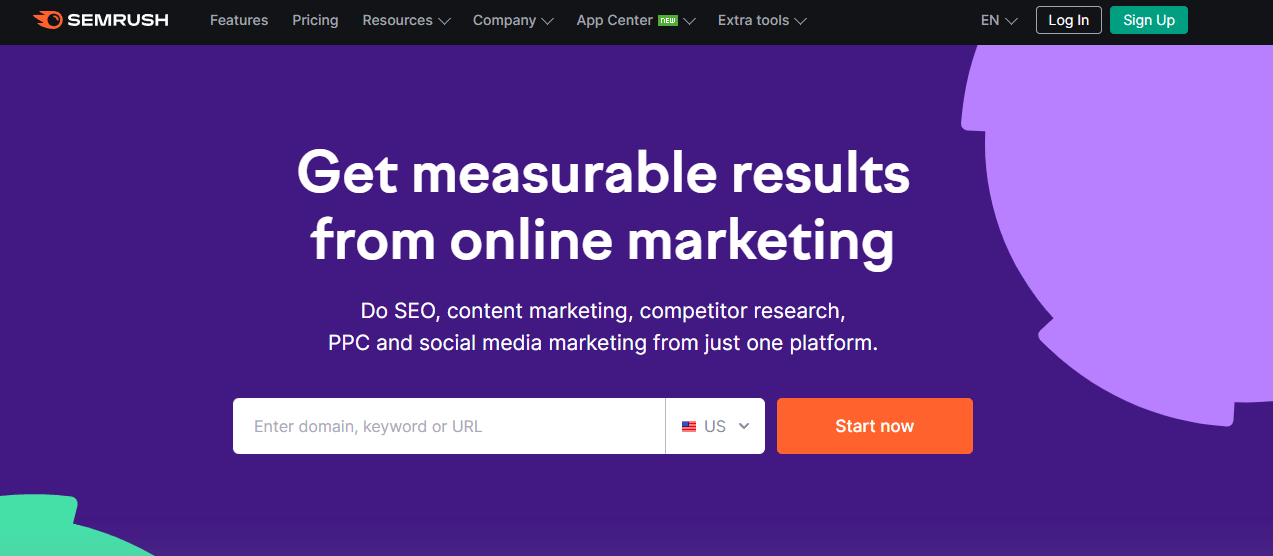
Using SEMRush’s data analysis capabilities gives marketers an edge when creating and optimizing content strategies for maximum success.
The Keyword Research Tool helps users find keywords with low competition and high search volume that are perfect for targeting particular products or services.
The Backlink Analysis Tool shows users which websites are linking to their sites so they can identify potential link opportunities.
Semrush also provides an extensive Organic Research Tool that lets users compare up to five different websites at once to see how their organic competitors are performing.
Users can also take advantage of the Competitor Analysis Tool to gain insights into how their competitors are performing on various platforms in terms of SEO, PPC campaigns, social media activity, backlinks, and other factors.
Utilizing the "Site Audit tool" allows users to quickly scan a website for any technical issues that might be preventing them from achieving better rankings.
Set up automated notifications if certain conditions are met & customize reports deliverable scheduled intervals too, enabling keeping tabs both convenient & efficient!
Overall, Semrush is an incredibly powerful tool that gives businesses the information they need to understand where they stand with their SEO efforts and how they can improve them.
With its detailed reports and comprehensive tracking tools, it's easy to see why so many companies rely on this service for their internet marketing needs.
Conclusion
Being able to analyze your results, gives you the power to maximize your efforts, selecting the right tools to use and build an effective content strategy is essential for businesses in 2023 and beyond.
All 10 analytics tools discussed in this article are well-equipped to help you measure your ROI goals and get the most out of your content marketing efforts.
